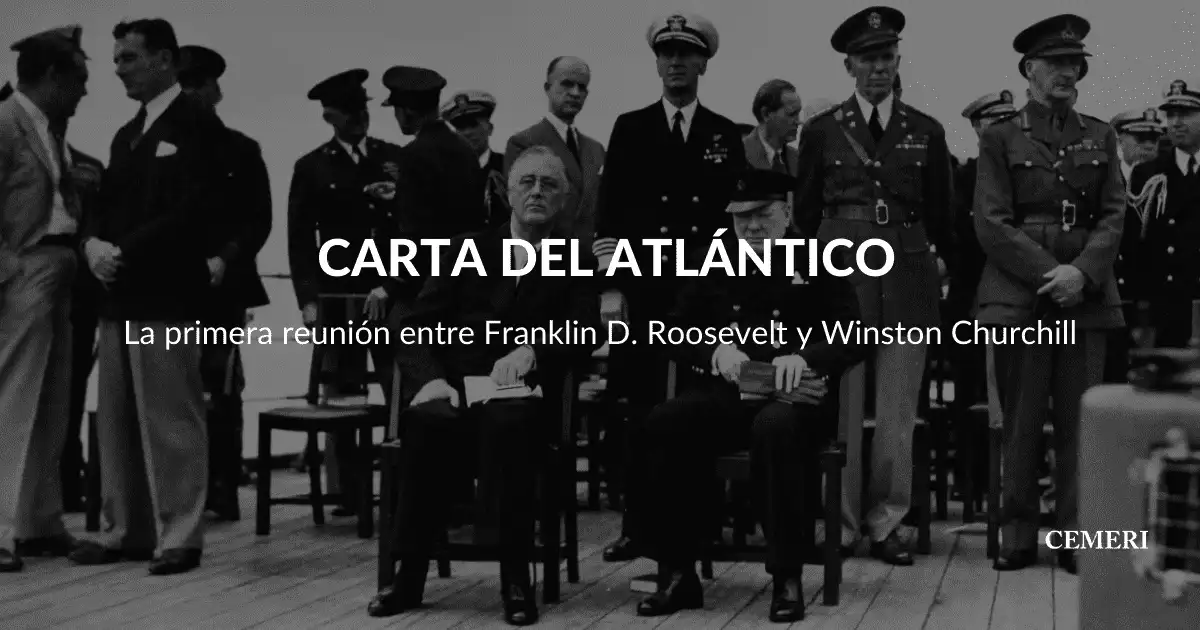Encyclopedia
Marco Olivera
What is the Atlantic Charter?
- The Atlantic Charter was a joint declaration by President Roosevelt and Prime Minister Winston Churchill.

The Atlantic Charter was a joint declaration made public on August 14, 1941 by the President of the United States, Franklin D. Roosevelt, and the Prime Minister of the United Kingdom, Winston Churchill, resulting from a conference at sea, establishing the their governments' peace goals for the post-World War II period, declared US support for the UK, and presented the two as an alliance against Germany. Subsequently, the declaration was endorsed by several countries and incorporated into the purposes of the United Nations.
Context
The meeting, called by Churchill, had as its main cause the geopolitical situation in Europe in mid-1941. From September 1940 to May '41, the Blitz took place, that is, Germany bombed the United Kingdom, but the British escaped a German invasion. The United States assured him of material support by passing the Lend-Lease Act in March of that same year.
Towards the end of May, German forces inflicted humiliating defeats on British, Greek and Yugoslav forces in the Balkans and threatened to invade Egypt and close the Suez Canal, thereby restricting British access to their Hindustan possessions.
Also, the United Kingdom was facing the Germans in Europe and feared that Japan might take British, French, and Dutch territories in Southeast Asia.
Meanwhile, in June 1941, Nazi Germany launched its invasion of the Soviet Union under Operation Barbarossa. Few politicians in Washington or London believed that the Soviets would be able to withstand the German attack for more than six weeks.
The Atlantic Charter
The meeting between the two leaders was organized in top secrecy. The United States helped the United Kingdom from the shadows, and the White House explained to the press the absence of President Roosevelt as a fishing vacation.
In his first conference during World War II, from August 9 to 12, 1941 (four months before the United States entered the war), Winston Churchill met with the President of the United States, Franklin D. Roosevelt, in August 1941 aboard two military ships - the cruiser USS Augusta (CA-31) and the British Royal Navy battleship HMS Prince of Wales - in Placentia Bay, Newfoundland, off the coast of Newfoundland, Canada.
They held nine face-to-face meetings and issued an unsigned joint declaration, known as the Atlantic Charter; it was not an official document, but rather a joint declaration expressing the war objectives of the two countries and a vision for the future between a technically neutral United States and a United Kingdom at war.
The Charter established the principles of self-determination, the end of colonialism, freedom of the seas and the improvement of living conditions and the collective work of all peoples in the fields of economy and security. Many of the ideas were similar to those proposed by President Woodrow Wilson's Fourteen Points during World War I, which were not accepted by the Allies at the Versailles Conference.
Historians often cite the agreement as one of the first significant steps toward the formation of the United Nations (UN). Other topics discussed in private included the US Navy's support for British merchant shipping in Atlantic convoys and the defeat of Germany following the United States' entry into World War II.
The Charter's call for self-government and self-determination also inadvertently became a touchstone for those around the world who wished to gain independence from European empires.
Consequences
The meeting was successful in drafting the objectives of the Charter, however it failed to produce the immediate results desired by the leaders of the Western powers. The American president hoped that the Letter would encourage his people to support the intervention of the North American country in World War II on the side of the Allies; however, public opinion was strongly opposed until the Japanese attack on Pearl Harbor in December 1941. Churchill wanted the United States to join the war, this was his main motivation for attending the secret meeting, but the United States would remain neutral. Barring that, he hoped the Americans would increase the amount of military aid to the UK and warn Japan against aggressive action in the Pacific.
Roosevelt, on the other hand, wanted the British government to state publicly that it was not involved in some sort of secret treaty, particularly over territorial issues, such as those concluded by the Allies during World War I over the division of enemy territory at the end of war.
Roosevelt also wanted to fix the terms by which the United Kingdom would pay the United States for its assistance under the Lend-Lease Act. The American president wanted the British to pay compensation by dismantling their Imperial Preference system, which had been established by the British during the Great Depression; designed to encourage trade within the British Empire by lowering rates of duty between its members; maintained discriminatory tariff rates against foreigners. In fact, the fourth principle of the Charter was based on the determination of the United States to dismantle the Imperial Preference and free world trade for the benefit of the country commanded by Roosevelt.
Returning to Churchill, he understood that various aspects of the proposed joint declaration could be politically damaging to the Prime Minister, as the abandonment of the Imperial Preference could cause a clash within the protectionist wing of his Conservative Party. The Americans were also reluctant to warn Japan too strongly against any future military action against British possessions in Southeast Asia. While the Atlantic Charter was not a binding treaty, embodying more symbolism than substance, that very symbolism was important in forging a close and valuable relationship between Roosevelt and Churchill for the remainder of the war.
But above all, it was important for several reasons: first, it publicly affirmed a sense of US-UK solidarity against Axis aggression; second, he laid out President Roosevelt's Wilsonian vision for the postwar world, one that would be characterized by freer trade, self-determination, disarmament, and collective security; finally, the Charter finally served as an inspiration for the colonial peoples of the Third World who were fighting for their independence.
The Atlantic Charter marked the first meeting between Roosevelt and Churchill, but they would meet again at future summits - the Cairo Conference, the Tehran Conference, the Yalta Conference - to discuss issues related to the course of World War II.
Joint Declaration of the Atlantic Charter
The full text of the Atlantic Charter and an analysis of each point are presented below.
The President of the United States of America and the Prime Minister representing the Government of His Majesty in the United Kingdom, having met in the Ocean, deem it appropriate to make known some principles on which they base their hopes for a better future for the world and that are common to the national policy of their respective countries:
- Your countries do not seek any territorial or other aggrandizement.
Roosevelt and Churchill were not looking for territorial gains. This was in stark contrast not only to past conflicts, but also to what his enemies and his main ally were after. After all, the Third Reich, Imperial Japan, the Kingdom of Italy, and the Union of Soviet Socialist Republics (USSR) all had territory since the beginning of the war.
- They do not wish to see any territorial change that is not in accordance with the freely expressed votes of the peoples concerned.
- They respect the right of all peoples to choose the form of government under which they want to live, and they want sovereign rights and the free exercise of government to be restored to those from whom they have been taken by force.
They also pledged not to make territorial changes that are inconsistent with the freely expressed wishes of the peoples concerned and supported the right of all peoples to choose the form of government under which they will live. This was an echo of Woodrow Wilson's promise of self-determination a generation earlier.
- They will endeavor, fully respecting their existing obligations, to extend to all States, small or large, victorious or defeated, the possibility of equal access to world trade and raw materials that are necessary for their economic prosperity.
- They wish to carry out the most complete collaboration among all nations, in the domain of the economy, in order to ensure improvements in working conditions, economic progress and social protection for all.
Remembering the failures of Versailles, the leaders ensured that the postwar peace shaped by the Atlantic Charter would break down barriers to trade, development and economic activity. If isolation, economic nationalism, and closed markets helped sow the seeds of war, they reasoned, then free trade, access to raw materials, free seas, and a more liberal economic system would characterize the world of culture. postwar period. One of the preconditions of any lasting peace will have to be the greatest possible free trade, FDR told Churchill during the Atlantic Conference.
- After the total destruction of Nazi tyranny, they hope to see a peace established that will allow all nations to live safely within their own borders and that will guarantee all men in all countries a free existence without fear or poverty .
Likewise, if the military defeat of Germany was incomplete in 1918, the Atlantic Charter unequivocally called for the final destruction of Nazi tyranny and the disarmament of aggressive nations. In other words, the aggressors would be treated in such a way that post-World War I mistakes would not be repeated.
- Such a peace will allow all men to navigate without hindrance over the seas and oceans.
- They are convinced that all the nations of the world, both for practical and spiritual reasons, must totally renounce the use of force. Since no future peace can be maintained if land, sea, or air weapons continue to be used by the nations that threaten it, or are likely to threaten it with aggression outside their borders, they consider that, pending the establishment of a security system general, comprehensive and permanent, the disarmament of such nations is essential. Likewise, they will help and promote all kinds of practical measures that alleviate the heavy burden of armaments that overwhelms peaceful peoples.
Finally, the Charter provided for the establishment of a broader and more permanent system of general security and a reduction in military spending. Two global wars in the span of 20 years convinced FDR and Churchill that they had an obligation to try to control humanity's destructive impulses that at the end of the war could destroy humanity itself.
Franklin D. Roosevelt—Winston Churchill August 14, 1941
Allied nations support the Atlantic Charter
On January 1, 1942, at a meeting of representatives of 26 countries (Australia, Belgium, Canada, China, Costa Rica, Cuba, Czechoslovakia, El Salvador, United States, Greece, Guatemala, Haiti, Honduras, India, Luxembourg, Nicaragua , Norway, New Zealand, Panama, Poland, the Netherlands, the United Kingdom, the Dominican Republic, South Africa, the Soviet Union, Yugoslavia) signed a "United Nations Declaration" in which they pledged to support the principles of the Atlantic Charter.
Sources
SIN FUENTES

